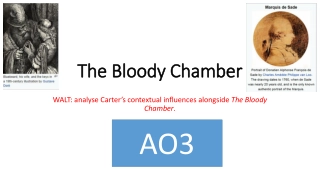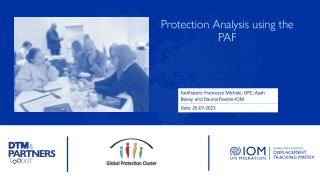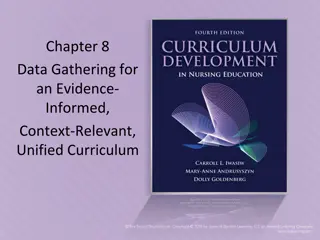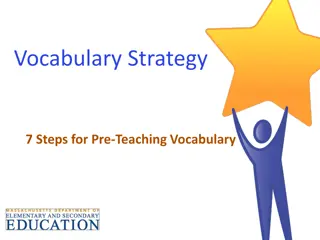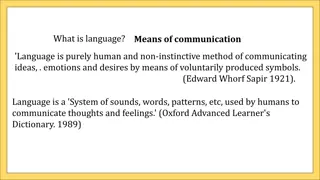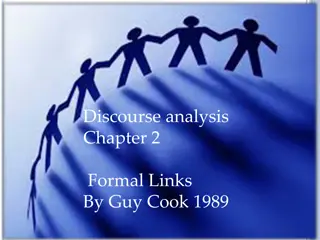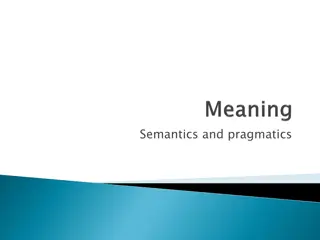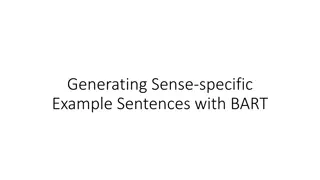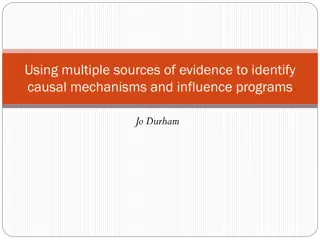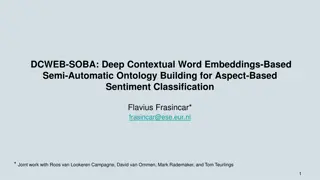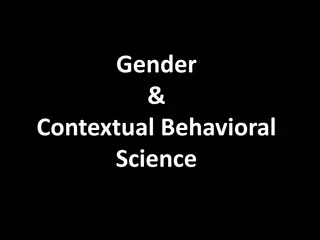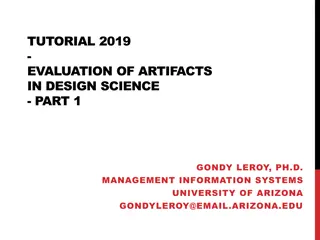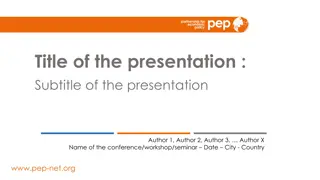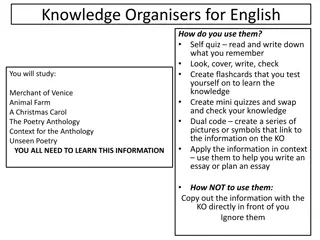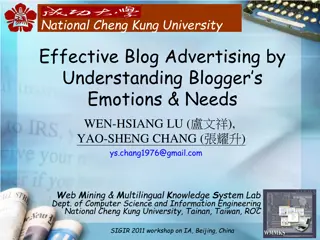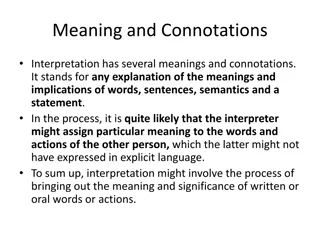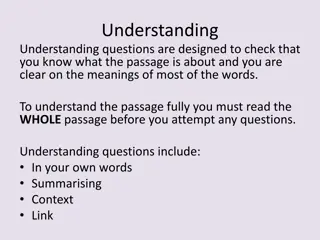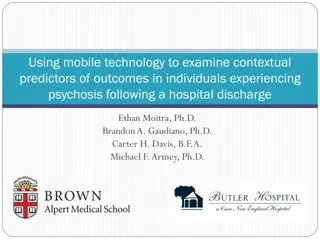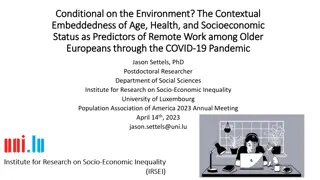Dividing the world of discourse
Explore how contextual dimensions like field, tenor, and mode shape language choices in text production, creating appropriate registers for diverse contexts. Understand why language variations differ in different genres and situations, influencing the coherence and cohesion of texts.
0 views • 14 slides
Evolution of Film Adaptations: From Silent Cinema to Modern Innovations
The moving picture industry emerged in the 1890s, paving the way for adaptations of literary works in the early 1900s. With the advent of sound, a new era of adaptations began, leading to experiments and innovations in modern filmmaking. Adaptation is a process of adjusting and presenting a work in
8 views • 23 slides
Angela Carter and Her Influential Works: A Contextual Analysis
Angela Carter, an English novelist known for her feminist and magical realism works, was influenced by her personal experiences and feminist ideologies. Her notable works include "The Bloody Chamber" and "The Sadeian Woman and the Ideology of Pornography". Carter's unique perspective on women's role
1 views • 26 slides
Protection Analysis using the PAF
In this session, participants will learn how to utilize the Protection Analysis Framework (PAF) and its tools to conduct effective protection analysis. The session covers an overview of PAF, understanding its pillars, and analyzing data to comprehend essential protection concepts. Key points include
5 views • 48 slides
Trusting Developers of AI Systems: When and How?
Trusting developers of AI systems should be based on their demonstrated trustworthiness. The problem lies in the wide range of risks associated with AI, where principles often lack concrete solutions, making compliance verification challenging. Addressing this requires assurance of safety, security,
0 views • 18 slides
Understanding Contextual Factors in Curriculum Development
This chapter delves into the significance of internal and external contextual factors in shaping curriculum development. It discusses the process of gathering essential contextual data, identifying relevant sources, and integrating data to create an evidence-informed, context-relevant, unified curri
5 views • 31 slides
Dissemination of CBS in Low- and Middle-Income Countries
This research project explores the obstacles, successful strategies, and perspectives related to disseminating Contextual Behavioral Science (CBS) in 11 countries across different continents. The study involves conducting interviews with psychologists who disseminate CBS, analyzing the data using th
7 views • 19 slides
Understanding Trauma, Stress, and Behavior: Insights from Research on Growing Up and Promoting Self-Regulation
Explore the impact of trauma, stress, and behavior on individuals through a contextual approach based on research findings. Learn about two types of individuals exhibiting antisocial behavior, the effects of social exclusion on brain function, and the influence of racial discrimination on brain micr
3 views • 20 slides
Advanced Techniques in 3D Scene Analysis for Spatial Understanding
Cutting-edge research in 3D scene analysis focuses on sequenced predictions over points and regions for comprehensive spatial understanding. The approach involves contextual classification, overcoming limitations of classical graphical models through innovative inference machines that prioritize tra
0 views • 40 slides
Effective Pre-Teaching Vocabulary Strategies for ELs
ELs benefit from specific pre-teaching vocabulary strategies such as selecting important words, providing contextual understanding, offering student-friendly definitions, and engaging in oral interactions. Massachusetts Department of Elementary and Secondary Education emphasizes the importance of ch
2 views • 7 slides
Mastering Presentation Skills for Success in World Theatre Tradition Research
Enhance your presentation style and delivery to excel in your World Theatre Tradition research by utilizing images, videos, and interactive elements. Avoid reading directly from cards, and ensure your timing is precise within the allocated 15 minutes. Cover key criteria like contextual background, c
1 views • 12 slides
Understanding Contextual Safeguarding in Multi-Agency Working
This workshop aims to assist multi-agency practitioners in developing Contextual Safeguarding approaches through team activities and discussions. The session covers partnership working outside the home, the ecological approach of Contextual Safeguarding, and an exercise on creating safety in various
0 views • 26 slides
Understanding Language: An Overview of Linguistics
Linguistics is the scientific study of language, a complex system of sounds, words, and patterns that humans use to communicate thoughts and feelings. Language consists of phonology (sounds), morphology (words), syntax (sentences), semantics (meaning), and pragmatics (contextual meaning). Different
0 views • 42 slides
Understanding Discourse Analysis: Formal Links and Contextual Connections
Discourse analysis involves examining language beyond grammar rules, focusing on formal links within sentences and contextual connections outside of language. Guy Cook discusses how formal features shape discourse meaning and how verb forms influence sentence coherence. The use of parallelism in spe
3 views • 22 slides
Exploring Texts, Culture, and Value Through Appropriation
In Year 11 Extension 1, students delve into texts from the past and their influence on present culture. They analyze the relationships between texts and culture, language's impact on values, and different responses to texts. Through close study, they explore key texts from the past, examining how th
0 views • 9 slides
Understanding Political Theory through a Contextual Approach
Exploring G.H. Sabine's perspective on political theory through a contextual approach, emphasizing the importance of historical context and societal influences. Sabine argues that while political theory evolves with its contemporary politics, it should be analyzed within its specific time and social
0 views • 9 slides
Understanding Semantics and Pragmatics in Language Study
Semantics and pragmatics are key areas of language study that focus on the meanings of words, phrases, and sentences. Semantics delves into the literal meanings and language as a system, while pragmatics explores how speakers use language in context. Understanding semantic meaning involves consideri
3 views • 77 slides
Insights from WJEC A Level English Literature Examiners' Report
Examiners noted candidates' strengths and weaknesses in analyzing poetry pre-1900 and unseen poetry. Candidates lacked confidence in discussing form and contextual influences, but some effectively integrated these aspects. Responses to individual poems were detailed, with contextual focus crucial in
3 views • 18 slides
Exploring Contextual Ideas in Frankenstein by Mary Shelley
An analysis of contextual ideas related to the study of Frankenstein by Mary Shelley. Delve into the key connotations, connections with other literary texts, and the enduring resonance of a novel written almost 200 years ago. Understand the significance of the contexts in which literary texts are wr
0 views • 57 slides
Exploring the Similarities Between Goldiamond's Work and CBS Approaches
Israel Goldiamond's work in professional development, ethics, and behavior analysis shows similarities with CBS approaches, emphasizing contextual factors, functional analyses, and long-term goals. Both approaches focus on understanding behavior within its context and promoting positive change throu
3 views • 5 slides
Motivating Patients on Smoking Cessation: A Contextual Approach Overview
Explore behavioral interventions for smoking cessation, gain insights into effective brief interventions, and learn to apply them using real-world examples. Understand the challenges in tobacco management in primary care and discover common strategies to support patients in quitting smoking. Embrace
0 views • 19 slides
Generating Sense-specific Example Sentences with BART Approach
This work focuses on generating sense-specific example sentences using BART (Bidirectional and AutoRegressive Transformers) by conditioning on the target word and its contextual representation from another sentence with the desired sense. The approach involves two components: a contextual word encod
0 views • 19 slides
Utilizing Multiple Sources of Evidence for Program Evaluation
This presentation by Jo Durham discusses the methodological framework for evaluating programs, focusing on causal mechanisms. It explores how participant reasoning and program resources combine to influence program success at different levels. The discussion also covers the impact of household livel
0 views • 36 slides
Semi-Automatic Ontology Building for Aspect-Based Sentiment Classification
Growing importance of online reviews highlights the need for automation in sentiment mining. Aspect-Based Sentiment Analysis (ABSA) focuses on detecting sentiments expressed in product reviews, with a specific emphasis on sentence-level analysis. The proposed approach, Deep Contextual Word Embedding
0 views • 34 slides
Understanding Gender and Behavioral Science
Exploring the nuances of gender, this content delves into the variance among genders, the impact of gender on behavior, and societal issues related to gender discrimination. It challenges the binary view of gender and highlights the performative spectrum influenced by culture, language, biology, and
0 views • 18 slides
Understanding Artifact Evaluation in Design Science Research
Explore the intricate process of evaluating artifacts in design science research with insights from Gondy Leroy, Ph.D., a seasoned expert in Management Information Systems. Discover the fundamental concepts, diverse study types, experiment design essentials, basic statistics, and contextual framewor
0 views • 71 slides
Policy Implications of Research on Contextual Factors Affecting Urban Development
Explore the impact of contextual factors on urban development, presenting research findings, policy implications, and recommendations. The presentation covers motivations, research questions, methodology, data analysis, and key findings to aid policymakers in enhancing urban planning strategies.
0 views • 12 slides
Study Guide for "Merchant of Venice" - Key Contextual Information and Analysis Points
Explore the key moments and contextual information of "Merchant of Venice" to enhance your understanding of the play. Delve into themes such as patriarchy, money lending, anti-Semitism, and more. Learn about the significant characters and events, along with analysis points to enrich your interpretat
0 views • 12 slides
Understanding Pragmatics: The Study of Language in Social Interaction
Pragmatics, a subfield of linguistics, focuses on the factors influencing language choice in social contexts. It differentiates between semantic and pragmatic information, emphasizing the relationship between language use, context, and the effects on communication. The study of pragmatics delves int
0 views • 20 slides
Understanding Contexts: A Meta-Ontological Approach
Ontologies provide a general representation of reality, but knowledge is mostly context-dependent. Analyzing different types of contexts, from linguistic to manufacturing, remains a challenge. This study aims to deepen the understanding of the ontological nature of contexts by leveraging a meta-onto
0 views • 14 slides
Understanding Blogger Emotions and Needs for Effective Blog Advertising
National Cheng Kung University researchers present an Event-driven Emotion-Need-based Advertising model (EENA model) to improve ad recommendations by understanding bloggers' emotions and needs. The study analyzes emotions and needs in blog articles related to life events, aiming to provide more rele
0 views • 18 slides
Unveiling the Art of Interpretation: From Textual Meanings to Contextual Significance
Interpretation delves into the meanings and implications of words, sentences, and classical texts, bringing out their significance. It involves decoding complex ideas, separating temporal and perennial thoughts, and revealing contemporary relevance. Different approaches like textual and contextual a
0 views • 18 slides
Study of Modern Drama and Prose Post-1900
This component focuses on the study of a modern play (The History Boys) and a modern prose text (The Great Gatsby). Learners explore cultural and contextual influences on writers and readers, analyze literary texts, demonstrate understanding of contexts, and make connections across texts. The examin
0 views • 23 slides
Comparative Analysis of University Literature Essays in Different English-Speaking Countries
Investigating variations in writing styles and tutor expectations among UK, New Zealand, and USA universities is crucial for Effective Academic Practices (EAP). Examples from Swiss universities and comparisons between British and American essay writing styles highlight the importance of understandin
0 views • 39 slides
Techniques for Passage Comprehension
Techniques such as understanding, summarizing, and contextual analysis are essential for effective passage comprehension. In your own words, summarizing key points, and deciphering contextual questions play a vital role in grasping the content fully. By utilizing these methods, you can enhance your
0 views • 46 slides
Contextual GAN for Image Generation from Sketch Constraint
Utilizing contextual GAN, this project aims to automatically generate photographic images from hand-sketched objects. It addresses the challenge of aligning output with free-hand sketches while offering advantages like a unified network for sketch-image understanding. The process involves posing ima
0 views • 21 slides
The Relationship Between Cognitive Flexibility and Psychological Flexibility After Acquired Brain Injury
This study explores how cognitive flexibility and psychological flexibility interact after an acquired brain injury. It examines whether individuals who exhibit cognitive inflexibility can achieve psychological flexibility, considering the impact of cognitive impairments post-injury. Cognitive flexi
0 views • 21 slides
Contextual Predictors of Psychosis Outcomes Post-Hospital Discharge
This study explores predictors of outcomes in individuals with psychosis post-hospital discharge using mobile technology. It addresses treatment nonadherence, the impact of antipsychotics, psychological flexibility, and the use of ecological momentary assessment (EMA). The research highlights the cr
0 views • 27 slides
Conditional on the Environment? The Contextual Embeddedness of Age, Health, and Socioeconomic Status as Predictors of Remote Work among Older Europeans through the COVID-19 Pandemic
This study delves into how the COVID-19 pandemic has influenced remote work patterns among older Europeans, focusing on the interaction between age, health, socioeconomic status, and contextual factors. It explores the impact of government restrictions, education, income, age, and health on the abil
0 views • 24 slides
Importance of Contextual Lead-Ins in Incorporating Quotes
When incorporating quotes in your SAR or body paragraph, it's crucial to provide a contextual lead-in. This means introducing the quote with a summary derived from the text itself. Examples from Bradbury's work illustrate how contextual lead-ins enhance the understanding and relevance of quoted pass
0 views • 6 slides


